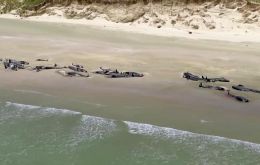MercoPress. South Atlantic News Agency
Tag: Ocean pollution
-
Wednesday, August 19th 2020 - 09:19 UTC
Some 21 million tons of micro plastic floating in the Atlantic ocean

There are 12-21 million tons of tiny plastic fragments floating in the Atlantic Ocean, scientists have found. A study, led by the UK's National Oceanography Centre, scooped through layers of the upper 200m of the ocean during a research expedition through the middle of the Atlantic.
-
Monday, November 26th 2018 - 07:40 UTC
New Zealand reports the death of some 145 pilot whales stranded in a beach

Like it happened in the Falkland Islands earlier in the month a group of up to 145 pilot whales have died after becoming stranded on a beach on Stewart Island in New Zealand. The animals were discovered by walkers late on Saturday, strewn along the beach of Mason Bay.
-
Wednesday, November 21st 2018 - 08:38 UTC
Dead sperm whale in Indonesia had kilos of plastic waste in its stomach

A sperm whale found dead in a national park in Indonesia had nearly 6kg of plastic waste, including 115 cups, in its stomach, park officials said on Tuesday. The 9.5m whale was found in waters near Kapota Island, part of the Wakatobi National Park, southeast of Sulawesi, the park said in a statement.
-
Monday, November 5th 2018 - 08:22 UTC
CCAMLR fails to protect Southern Ocean

The Commission for the Conservation of Antarctic Marine Living Resources (CCAMLR) has again failed to take action to protect the Southern Ocean, with no progress made on the critical issues of marine protected areas, climate change, and transshipment.
-
Wednesday, April 25th 2018 - 09:06 UTC
Tons of frozen micro-plastics found trapped in the floating ice of the Arctic

Record levels of micro-plastics have been found trapped inside sea ice floating in the Arctic. Ice cores gathered across the Arctic Ocean reveal micro-plastics at concentrations two to three times higher than previously recorded. As sea ice melts with climate change, the plastic will be released back into the water, with unknown effects on wildlife, say German scientists.
-
Wednesday, February 21st 2018 - 09:09 UTC
Oceans' plastic pollution is illegal but, how to implement international treaties and conventions?

The pollution of oceans with plastic litter, discarded nylon fishing nets and eco-toxic micro-beads is well known as one of the great scourges of the modern age ― not just entangling and choking endangered, charismatic species like sea turtles, dolphins and even great whales, but attracting long-lived organic pollutants that end up permeating the entire marine food chain, right up to the fish on our plates.
